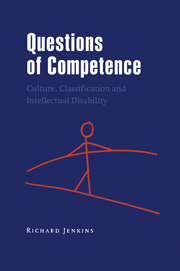Book contents
- Frontmatter
- Contents
- List of contributors
- 1 Culture, classification and (in)competence
- 2 Mental disability in the United States: an interactionist perspective
- 3 (In)competence in America in comparative perspective
- 4 Risk, resilience and competence: parents with learning difficulties and their children
- 5 Constructing other selves: (in)competences and the category of learning difficulties
- 6 Work, opportunity and culture: (in)competence in Greece and Wales
- 7 Slow cookers and madmen: competence of heart and head in rural Uganda
- 8 States and categories: indigenous models of personhood in northwest Greenland
- 9 Learning to become (in)competent: children in Belize speak out
- 10 Towards a social model of (in)competence
- Bibliography
- Index
9 - Learning to become (in)competent: children in Belize speak out
Published online by Cambridge University Press: 16 January 2010
- Frontmatter
- Contents
- List of contributors
- 1 Culture, classification and (in)competence
- 2 Mental disability in the United States: an interactionist perspective
- 3 (In)competence in America in comparative perspective
- 4 Risk, resilience and competence: parents with learning difficulties and their children
- 5 Constructing other selves: (in)competences and the category of learning difficulties
- 6 Work, opportunity and culture: (in)competence in Greece and Wales
- 7 Slow cookers and madmen: competence of heart and head in rural Uganda
- 8 States and categories: indigenous models of personhood in northwest Greenland
- 9 Learning to become (in)competent: children in Belize speak out
- 10 Towards a social model of (in)competence
- Bibliography
- Index
Summary
Every institutionalised educational system (ES) owes the specific characteristics of its structure and functioning to the fact that, by the means proper to the institution, it has to produce and reproduce the institutional conditions whose existence and persistence (self reproduction of the system) are necessary both to the exercise of its essential function of inculcation and to the fulfilment of its function of reproducing a cultural arbitrary which it does not produce (cultural reproduction), the reproduction of which contributes to the reproduction of the relations between the groups or classes (social reproduction).
Pierre Bourdieu (1973: 77)As far as we know, all cultures determine who is ‘in’, who is ‘out’, who is clean, who is unclean, who are the chosen, who are not. Not until the rise of the nation-state, however, and the emergence of capitalism, did social competence take the form of intellectual competence measured by ‘scientific’ testing, quantifying, measuring and subsequent ranking. Just as Western movies, television, food and ideology have been exported around the globe, so has this ‘scientific’ sense of competence. Ironically it is reinforced by contemporary sentiments about equality: if everyone is equal and has access to the same things, then the truly gifted, intelligent, competent individuals will rise to the top and the other less competent, dumber and lazier will stay at the bottom (Bowles and Gintis 1976).
Belize, in Central America, is a recently politically decolonised country, which is frequently characterised as a ‘poor’, ‘underdeveloped’, ‘developing’ or ‘third world’ nation.
- Type
- Chapter
- Information
- Questions of CompetenceCulture, Classification and Intellectual Disability, pp. 194 - 221Publisher: Cambridge University PressPrint publication year: 1999
- 1
- Cited by



